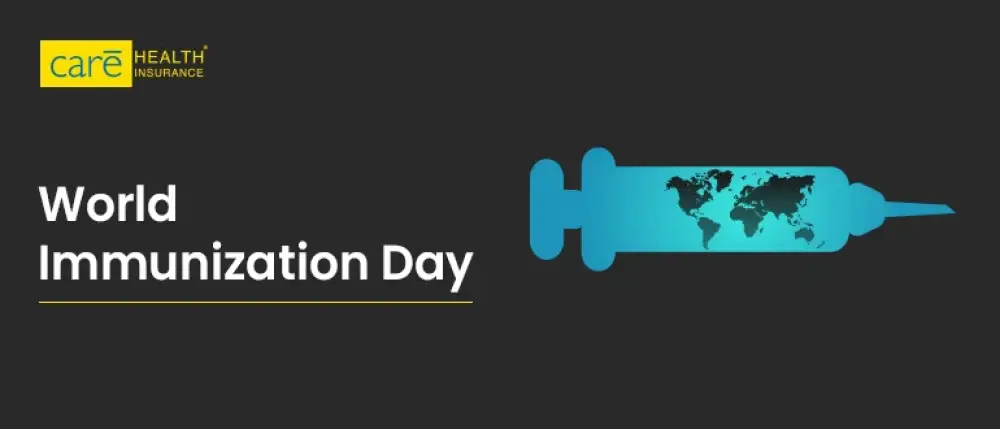The greatest boon that medical science has given to mankind is the development of vaccines, which have ensured widespread immunization. Today, timely vaccination can easily avert death due to fatal diseases. WHO launched the Immunization Agenda in 2021, revealing that over 20 life-threatening diseases can now be prevented through immunization.
To realise the importance of immunization, World Immunization Day is observed annually on November 10. It holds profound significance as a global effort to propagate early vaccination to protect people of all ages against life-threatening diseases. It is a vital campaign that underscores community's responsibility to ensure access to life-saving immunisations to everyone, everywhere.
The success of the global immunization drive lies in the fact that since 2010, vaccines have been introduced in 116 countries that previously did not use them. These include vital immunizations against major deadly diseases such as pneumococcal pneumonia, cervical cancer, diarrhoea, meningitis, cholera, and typhoid.
Aiming for financial and physical immunity, let’s delve into the significance of World Immunization Awareness Day 2025.
World Immunization Day: Role in Global Disease Prevention and Eradication
The primary significance of World Immunization Awareness Day 2025 lies in recognising immunization as the noblest and most effective public health interventions in history.
- Preventing Outbreaks: Globally, immunization programs avert millions of deaths annually from life-threatening diseases such as measles, polio, tetanus, and influenza, stopping outbreaks before they can spread worldwide.
- Disease Eradication: Vaccines have led to the complete eradication of smallpox and have brought the world to the brink of eradicating polio, demonstrating their potential to eliminate devastating diseases permanently.
- Reducing Mortality: Vaccines are critical for children. They significantly reduce infant and child mortality rates, helping countries achieve global health and development goals.
What is the History of World Immunization Day?
The World Health Organization (WHO) launched World Immunization Day in 2012 to mark its global initiative to boost vaccination rates worldwide: the Expanded Program on Immunization (EPI). The EPI was launched on November 10, 1974, to attain the global mission of universal immunization coverage.
The World Immunization Day acts as an essential reminder to both governments and individuals about the vital function of vaccines in preventing fatal and life-threatening diseases like measles, polio, tetanus, and diphtheria.
What is the World Immunization Day Theme for 2025?
The official theme for World Immunization Day 2025 will be set by major international health organisations such as the WHO and UNICEF closer to the date. Based on current global health priorities, recurring campaigns, and the Immunization Agenda 2030, the 2025 theme is highly likely to focus on the following critical areas that aim to restore vaccination rates that dropped during the pandemic:
- “Closing the Gap,”
- “Vaccines for All,” or
- “Reaching the Last Mile”
The ultimate goal is to achieve the mission of universal access to vaccines.
What is Immunization Agenda 2030?
WHO had launched a mission in 2021 to achieve universal access to vaccines:
Immunization Agenda (IA2030): A Global Strategy to Leave No One Behind
This is a comprehensive, ambitious global vision and strategy to address the challenges of vaccination and realise the full potential of vaccines over the decade from 2021 to 2030.
Agenda for World Immunization Awareness Day 2025
World Immunization Awareness Day 2025, in accordance with IA2030, will aim to mobilise support for future vaccination efforts in the following ways:
- Driving Innovation: It highlights the continuous need for research and development to create vaccines for emerging threats (like new viruses or antibiotic-resistant bacteria) and improve the effectiveness of existing ones.
- Policy and Funding: It provides an opportunity for global health organisations, governments, and NGOs to advocate for strong public health policies and secure sustained financial commitment for vaccination programs worldwide.
How does Immunization Protect Community Health?
Immunization protects not only the vaccinated individual but also the wider community, a concept known as herd immunity.
- Shielding Vulnerable Groups: When a high percentage of the population is immunised, it breaks the chain of transmission, providing indirect protection to those who cannot be vaccinated, such as infants, senior citizens, or individuals with compromised immune systems.
- Sustaining Public Services: By reducing the incidence of infectious diseases, immunization prevents healthcare systems from becoming overwhelmed, ensuring resources are available for other critical health needs.
Unlock Economic and Societal Benefits with Vaccination!
Beyond the direct health benefits, vaccination is an investment that yields substantial economic returns. Here’s how:
- Cost Savings: Preventing illness is far more cost-effective than treating it. Vaccines save billions of dollars annually by avoiding the costs associated with hospitalisations, long-term care, and lost productivity.
- Educational Stability: Preventing childhood diseases means fewer sick days for children and parents, contributing to better school attendance, improved learning outcomes, and sustained workforce participation.
- Global Health Equity: The day serves as a reminder to address health disparities, ensuring that low-income countries and marginalised communities receive the necessary vaccine infrastructure and supply to achieve health equity.
World Immunization Day is thus a pivotal moment to reflect on the immense progress made through vaccines and to reaffirm the global commitment to protecting everyone from vaccine-preventable diseases.
Apart from vaccination, you need something more that shields from a health emergency.
A Health Coverage to Stay Financially Immune
Just like vaccination guarantees immunity against dreadful and fatal diseases, adequate health insurance assures you of financial immunity against medical emergencies. It serves as an ideal companion whenever you face a health crisis, providing timely coverage of high medical costs that include diagnosis, treatment, and post-hospitalisation expenses. As a wise health planner, you must be prepared with an affordable health insurance plan so that you don’t suffer due to long waiting periods.
Disclaimer: It is essential to verify the policy details and coverage with the official policy documents. Additionally, please consult a professional medical expert to confirm the details of your health concerns.
